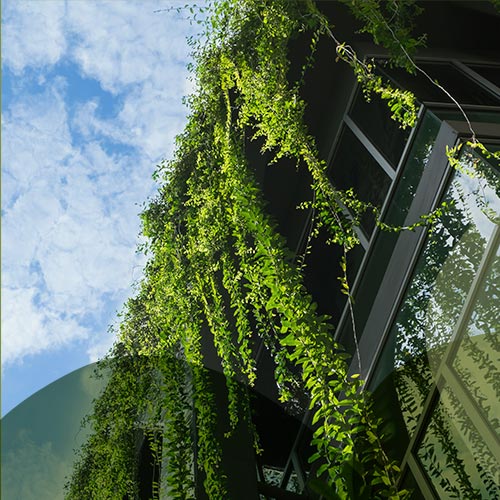SUSTAINABLE BUILDING CERTIFICATION
DEVELOPMENT MANAGEMENT GROUP
Sustainable buildings make perfect sense. They’re cheaper to run, provide healthier workplaces, and have excellent marketing potential. DMG provides Sustainability Consulting and Building Certification services for new construction projects and existing buildings.
We offer building sustainability rating services for most systems, including LEED, EDGE, WELL, TREES, and TRUEZero Waste. Our services will result in buildings that consume less energy, water, and materials while improving occupant productivity and health. We coordinate design teams to think outside the box and create better buildings.
DMG is proud to have achieved LEED Gold certification for the first resort project to do so in SE ASIA.
Built environments consume vast amounts of energy in their construction and maintenance.
DMG is a leader in Sustainable Building Certification
Reasons to certify your building with a sustainable rating system:
- Save on electricity bills
- Save on water bills
- Improve occupant productivity
Improve employee engagement
Improve occupant health
Provide marketing benefits
Increase the building’s value
Align with corporate values
Reduce the environmental impact of buildings
LEED (Leadership in Energy and Environmental Design)
LEED (Leadership in Energy and Environmental Design) is the recognized world leader in green building certification systems. No system has more registered projects worldwide than LEED. LEED certified buildings have proven to less impact on the environment and provide operational cost savings through less use of energy and water. LEED buildings also provide a better internal air environment and thus can lead to better employee attendance by preventing sick building syndrome and provide a healthier environment for families. LEED achieves this by focusing on several categories for sustainable buildings:
- Integrative Process
- Sustainable Sites
- Location and Transportation
- Water Efficiency
- Energy and Atmosphere
- Indoor Environmental Quality
- Innovation in Design
- Regional Priority
EDGE (Excellence in Design for Greater Efficiencies)
EDGE is a green building system for residential and commercial buildings. EDGE was created by the International Finance Corporation (IFC) to foster more green building projects in the developing world by providing a simple rating system. EDGE’s free software enables you to determine the most cost-saving options for your building’s resource-efficient design. If you achieve a minimum of 20% less energy, water, and embodied energy in materials than a standard building, then your project has met the EDGE standard.
The EDGE software shows how committing to a few practical energy and water-saving options improve building performance without incurring much if any additional costs. The savings are quickly calculated and displayed to reveal the most economically viable path to sustainable building design. Designers input their building location and design data online, choosing from a list of sustainable features, to show the results of savings in energy, water, and material embodied energy.
TREES (Thai’s Rating of Energy and Environmental Sustainability)
TREES (Thai’s Rating of Energy and Environmental Sustainability) is a newer system based on the USGBC’s LEED system specially modified for Thailand. As with LEED, TREES buildings have positive environmental impacts and bring cost savings to building owners. The TREES system is point-based, with projects being awarded points based on the categories and the sustainable measures selected.
The TREES system currently only has Existing Building and New Construction categories and is expanding to include other project types in the near future.
There are several credits categories as with LEED to help focus the building design on sustainability. These categories include:
- Building Management
- Site and Landscape
- Water Conservation
- Energy and Atmosphere
- Materials and Resources
- Indoor Environmental Quality
- Environmental Protection
TRUE ZERO WASTE (The TRUE program for zero waste certification)
TRUE certified spaces are environmentally responsible, more resource-efficient, and help turn waste into savings and additional income streams. By closing the loop, they cut greenhouse gases, manage risk, reduce litter and pollution, reinvest resources locally, create jobs, and add more value for their company and community.
TRUE is a whole systems approach aimed at changing how materials flow through society, resulting in no waste. TRUE encourages the redesign of resource life cycles so that all products are reused.
TRUE promotes processes that consider the entire lifecycle of products used within a facility. With TRUE, your facility can demonstrate to the world what you’re doing to minimize your waste output.
WELL BUILDING SYSTEM (WELL Building Institute)
The WELL Building Standard is the first building standard to focus exclusively on the health and wellness of the people in buildings. WELL is an evidence and performance-based system for measuring, certifying, and monitoring features that impact human health and well-being in the built environment through air, water, nourishment, light, fitness, comfort, and mind.




